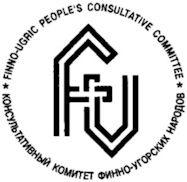
Resolution 2019
Regulations of the World Congress of Finno-Ugric Peoples

THE CONSULTATIVE COMMITTEE OF FINNO-UGRIC PEOPLES
Regulations of the World Congress of Finno-Ugric Peoples
Adopted at the meeting of the Consultative Committee of Finno-Ugric Peoples 1.6.2019 in St. Petersburg:
- General provisions
1.1. The World Congress of Finno-Ugric Peoples (hereinafter: the Congress) is a forum for the representatives of the Finno-Ugric and the Samoyed peoples, which does not depend on governments and political parties and which in its activities relies on the Declaration of the basic co-operation principles, goals and tasks of the Finno-Ugric Peoples of the world. (Syktyvkar, 1992).
1.2. In order to secure implementation of its decisions the Congress sets up a coordinating body – the Consultative Committee of Finno-Ugric Peoples.
1.3. The Congress is competent when not less than ½ of the delegations of the peoples, represented in the Consultative Committee of Finno-Ugric Peoples, participate in the work of the Congress.
- Aims of the Congress:
2.1. Furthering of co-operation between Finno-Ugric peoples, as well as between Finno-Ugric and other peoples in the field of culture, science, education, information, law, ecology, social and political matters and economy;
2.2. Assistance in the development of languages and cultures, as well as the ethnic identity of Finno-Ugric peoples;
2.3. Assistance in the implementation of international norms in the field of human rights, the rights of peoples to self-determination and the rights of indigenous peoples.
- Delegates, participants of the Congress
3.1. The delegates of the Congress are freely selected by the peoples, the mechanism for forming of a delegation is not regulated.
3.2. The highest representative bodies of the peoples have the right to delegate representatives and in their absence the delegates are chosen by the joint decision of NGOs, representing the interests of their peoples. Organizations, the term of office of which is more than three years, have the right to nominate their representatives, who will participate in the work of the Congress. The procedures for forming delegations must be transparent and take into consideration the legislation in force of the said country concerning NGOs. Disputable issues are decided upon by the Consultative Committee of the Finno-Ugric Peoples provided that the time limits for submitting the above issues have been observed.
3.3. The following parties may participate in the work of the Congress: observers and experts invited by the Consultative Committee, guests, representatives of the legislative and executive authorities of the countries, regions and local self-government bodies.
3.4. The norms for being a representative and for participating in the work of the Congress are determined by the Consultative Committee of Finno-Ugric peoples.
- Work order of the Congress:
4.1. The work of the Congress takes place in the form of plenary and sectional meetings.
4.2. The following bodies are set up for the work of the Congress: the Presidium, the Secretariat, the Editorial Committee and Poll Committee.
4.3. The Presidium:
4.3.1. Is made up of delegates on the basis of proposals made by the Consultative Committee and confirmed by the Congress.
4.3.2. Chairs the work of the Congress.
4.3.3. Decides upon matters of a procedural (practical) character, as well as matters, which exceed the limits of the present Regulations.
4.4. The Editorial Committee:
4.4.1. The Editorial Committee comprises one representative from each peoples’ delegation, if necessary it has the right to hear the opinion of experts;
4.4.2. The chairman of the Editorial Committee is confirmed at its first meeting in accordance with the recommendation of the Consultative Committee;
4.4.3. The Editorial Committee works on and puts the finishing touches to the draft Conclusive document of the Congress, as well as to the other draft documents;
4.4.4. The delegates and observers may submit to the Editorial Committee amendments to the Concluding document, as well as to the other draft documents before the end of the time-limit determined by the Presidium.
4.4.5. The Editorial Committee makes decisions based on consensus;
4.5. Poll Committee
4.5.1. The Poll Committee is set up by the Congress.
4.6. Plenary session:
4.6.1. Hears the report of the Chairman of the Consultative Committee of Finno-Ugric Peoples and assesses the work of the Consultative Committee;
4.6.2. Grants the right to speak on behalf of the peoples´ delegations.
4.6.3. Hears the recommendations of the sections;
4.6.4. Adopts the documents prepared by the Editorial Committee;
4.6.5. Makes decisions based on consensus, in this connection every peoples’ delegation has one vote;
4.6.6. Decisions concerning procedural (practical) items are made by simple majority of votes, cast by the delegations.
4.7. Meetings of the Sections:
4.7.1. The Consultative Committee determines the agenda of the meetings of the sections;
4.7.2. The Consultative Committee nominates the leaders of the meetings of the sections;
4.7.3. The aim of the meetings of the sections is to discuss matters of most current interest and to draw up recommendations on the basis of the discussed matters.
4.7.4. The Sections may invite experts, observers and guests of the Congress to take part in their work;
4.8. Documents of the Congress:
Documents of the Congress are:
4.8.1. The Concluding Document of the World Congress of Finno-Ugric Peoples;
4.8.2. Recommendations of the meetings of the sections.
4.8.3. Declarations, appeals and applications;
4.8.4 The Final Document, as well as the declarations, appeals and applications are proposed by the Editorial Committee and adopted by the Congress at its closing plenary session.
4.8.5. The decisions of the Congress act as recommendations and are determining in the work of the Consultative Committee of Finno-Ugric peoples. They cannot be revised or revoked by any other body than the Congress itself.